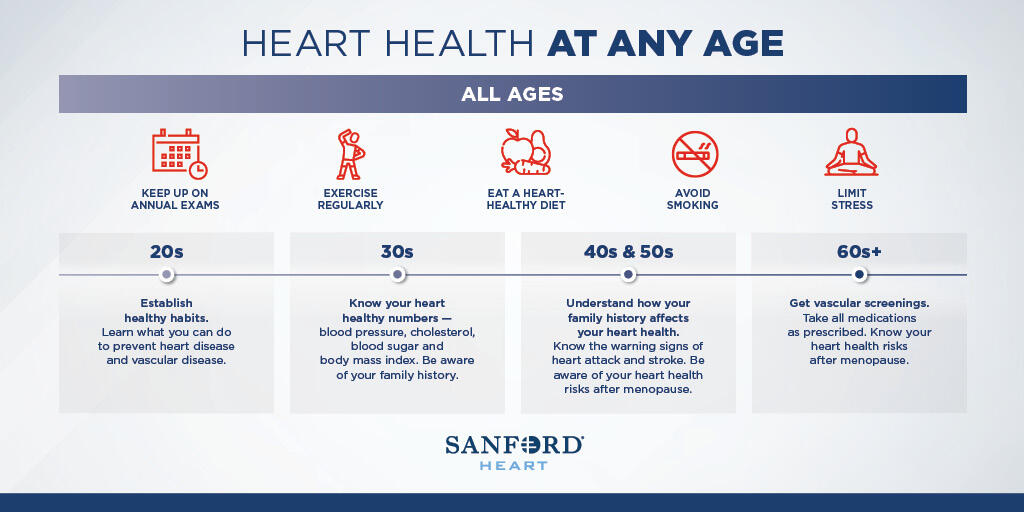Oftentimes heart complications arise in patients you’d least expect.
Just because a patient might not have classic risk factors for heart complications, doesn’t mean they won’t happen, says Sanford Health cardiology specialist Kelly Steffen, D.O.
“I had a patient, he’s only 42, come in with a heart attack and ended up needing a stent. He exercised routinely, he had no risk factors, he doesn’t even really have a family history,” said Dr. Steffen.
And some risk factors can’t be controlled.
“Genetics have an impact,” she added.
Dr. Steffen says this is why routine check-ups, monitoring, and preventive measures are direly important in preventing heart disease, heart attacks, and any other heart complications.
‘You’re not invincible’
Regardless of your age, level of physical activity, or quality of diet, you may still be at risk, said Dr. Steffen.
Enlarge

Graphic by Sanford Health
“The keys are knowing your risk factors, but also knowing you’re not invincible. Pay attention to symptoms, even if you don’t have the classic risk factors,” she said.
Classic risk factors include: high blood pressure, high cholesterol levels, diabetes, obesity, heavy alcohol usage, and smoking.
Know your numbers: Do you need a heart screening?
To help prevent heart disease, Dr. Steffen stresses the importance of yearly exams.
“Everybody, from childhood on, should have a yearly exam with a physician with a blood pressure check, a heart rate check, and all of that. Especially if you’re young and don’t have other risk factors.
“As you age, at 40 and beyond you should have cholesterol checked yearly,” she said.
Routine visits are also a good way for patients to remind themselves of the things their health care provider has encouraged them to do.
“Routine visits with any kind of health care provider makes you do an assessment of yourself, and how you’re feeling, and how you’re doing. It maybe makes you think about those subtle changes that maybe you don’t think about on a day-to-day basis,” according to Dr. Steffen.
Support your heart, listen to your body
Whether it’s a shout or a whisper, when your body starts talking to you, listen to it.
“It doesn’t have to be that you’re having crushing chest pain. But, maybe you’re the guy who ran three miles last year, and now you run for a mile and you’re starting to get winded. That’s a subtle change.
“You probably aren’t not going to run off to the doctor just because your exercise tolerance isn’t quite what it was, because everybody’s going to blame that on age. So, those exams and routine vital signs once a year, even at a young age, is very important.”
At any age, Dr. Steffen recommends patients follow a heart-healthy, nutritious diet in order to both support their heart, and have a higher chance at preventing heart disease.
Because high cholesterol is a risk factor, she recommends avoiding highly processed foods. Foods with high counts of trans and saturated fats have been known to increase cholesterol.
On occasion, Dr. Steffen and other heart specialists have encouraged patients to lose weight in order to improve their heart health. A wildly popular weight-loss diet is the keto diet. Millions have indeed lost weight by following the high-fat, low-carb diet, but Dr. Steffen says patients should be approach the keto diet with caution.
“We know weight contributes to coronary disease. The problem is when people are in ketoacidosis and we took their cholesterol, the numbers are off the charts. Their cholesterol, triglycerides, and low-density lipoprotein (LDL) are skyrocketing in that period of time.”
Instead, she recommends following a diet high in vegetables and lean protein.
“Monitoring and eating healthy fats, eating lean protein, and choosing mostly plant-based is a much safer diet. Something akin to the Mediterranean diet,” she said.
Genetics play a part
Dr. Steffen says as patients age, there’s an increased need for responsibility when it comes to heart health.
But, the earlier a patient adopts these lifestyle choices, the better the possibility for heart disease prevention.
Things everyone should do, according to Dr. Steffen: regular wellness exams, physical activity, not smoking, knowing risk factors like family history, eating well, and limiting stress.
She adds that knowing your family’s history is especially important because “you can’t eat your way out of bad genetics, or work your way out of bad genetics with an exercise regimen.
“If we start earlier, maybe those practices will be ingrained, and you can take better care of yourself as you get older.”
Heart health at any age
- 20s: Establish healthy habits — get a yearly checkup. Avoid smoking. Exercise regularly. Eat a heart-healthy diet. Limit stress.
- 30s: Keep annual exams. Know your heart health numbers — blood pressure, cholesterol, blood sugar, BMI.
- 40s & 50s: Keep up annual exams. Understand your family history. Know the warning signs of heart attack and stroke. Be aware of your heart health risks after menopause.
- 60s and beyond: Keep your annual checkups. Get vascular screenings. Remain active. Take all medications as prescribed. Know your heart health risks after menopause.
Learn more
- Coronary calcium screening reveals hidden heart problems
- Strokes: 5 surprising facts about who’s at risk
- Keeping your heart emotionally healthy
…
Posted In Family Medicine, Healthy Living, Heart, Internal Medicine, Menopause Care, Vascular
